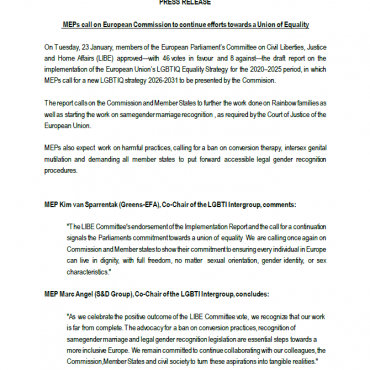European Parliament strongly condemns anti-LGBTI laws in Uganda, Nigeria and India
In a resolution adopted yesterday, the European Parliament strongly condemned recent moves to criminalise LGBTI people in Uganda, Nigeria and India. Parliament also called on Russia to repeal its law prohibiting the propaganda of ‘non-traditional sexual relations’.
Earlier this month, Nigeria’s President signed the ‘Same-Sex Marriage (Prohibition) Bill’, punishing people in a same-sex relationship with up to 14 years in prison, and anyone running a gay bar or organisation with 10 years in prison.
Last month, the Ugandan Parliament adopted the ‘Anti-Homosexuality Bill’, which punishes consensual relationships between adults of the same sex with life imprisonment, support for LGBTI people’s rights with 7 years’ imprisonment, and the non-denunciation of LGBTI people with 3 years’ imprisonment.
The European Parliament strongly condemned these two laws, reminding Uganda and Nigeria of their own obligations under international human rights law.
The resolution also welcomed the move by the Indian government to ask the Supreme Court to review the ruling which re-criminalised homosexuality. In December 2013, the Indian Supreme Court overruled a 2009 decision by a lower court, which had held that Section 377 (making homosexuality illegal) violated the constitutional principle of equality.
Michael Cashman MEP, Co-president of the LGBT Intergroup, reacted: “I am appalled by the reinforced criminalisation of LGBTI people in Uganda and Nigeria. The EU and its Member States should use all powers at their disposal to push for full decriminalization immediately.”
“Furthermore, I strongly discourage all LGBTI tourists from visiting, and any business to send employees to Uganda or Nigeria as these laws apply to them too.”
Ulrike Lunacek MEP, Co-president of the LGBT Intergroup, continued: “The Indian Supreme Court ruling came as a complete shock, but the government has made the right choice by seeking to annul that backward ruling. LGBTI people must be able to live their lives without fear of arrests and violence against them for being who they are.”
Read more:
- Read the resolution adopted on recent moves to criminalise LGBTI people
- Read our previous post on the Nigerian and Ugandan anti-LGBT law
- Read our previous post on India’s Supreme Court decision to re-criminalise homosexuality
- Read our previous post on Russia’s federal anti-propaganda law







